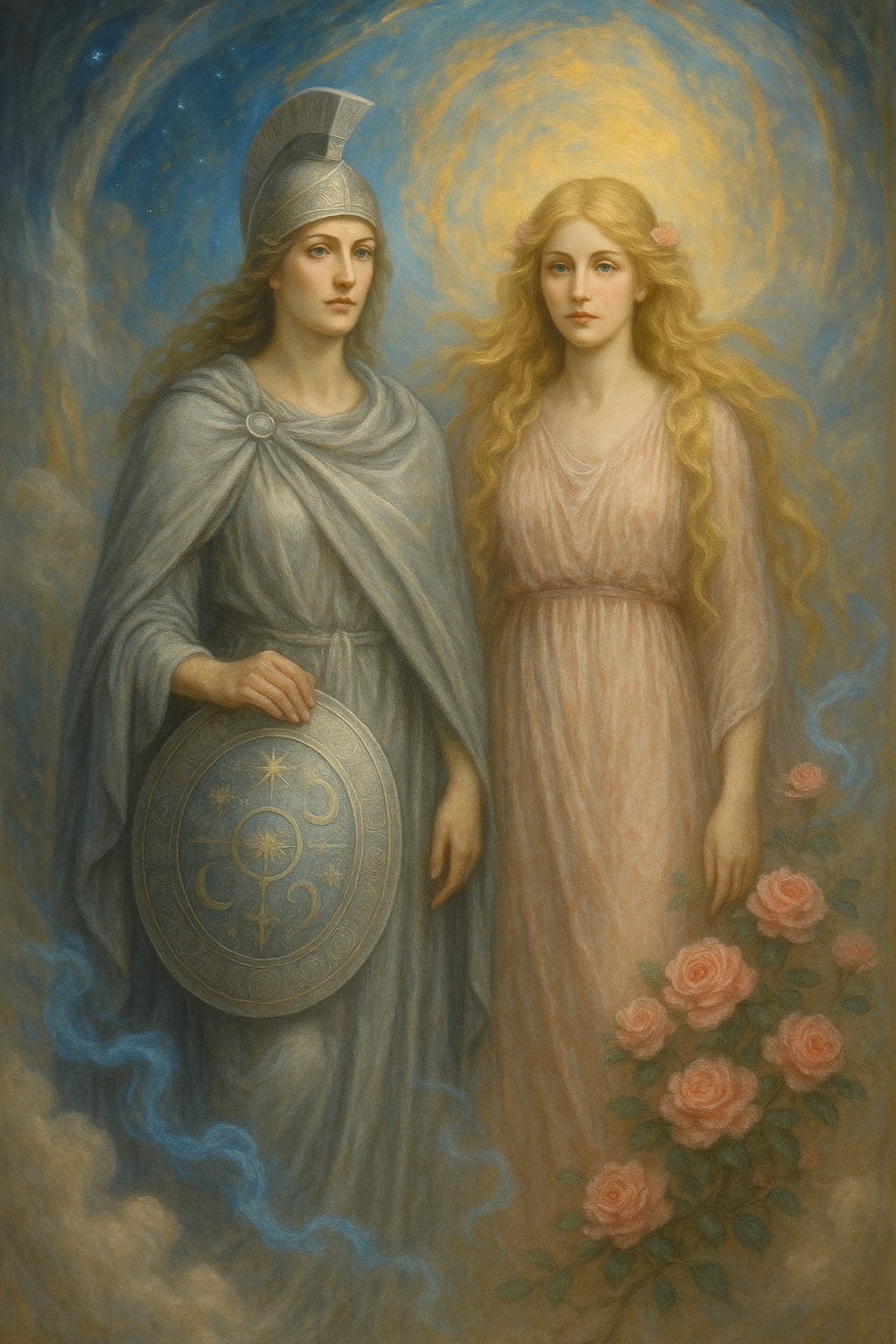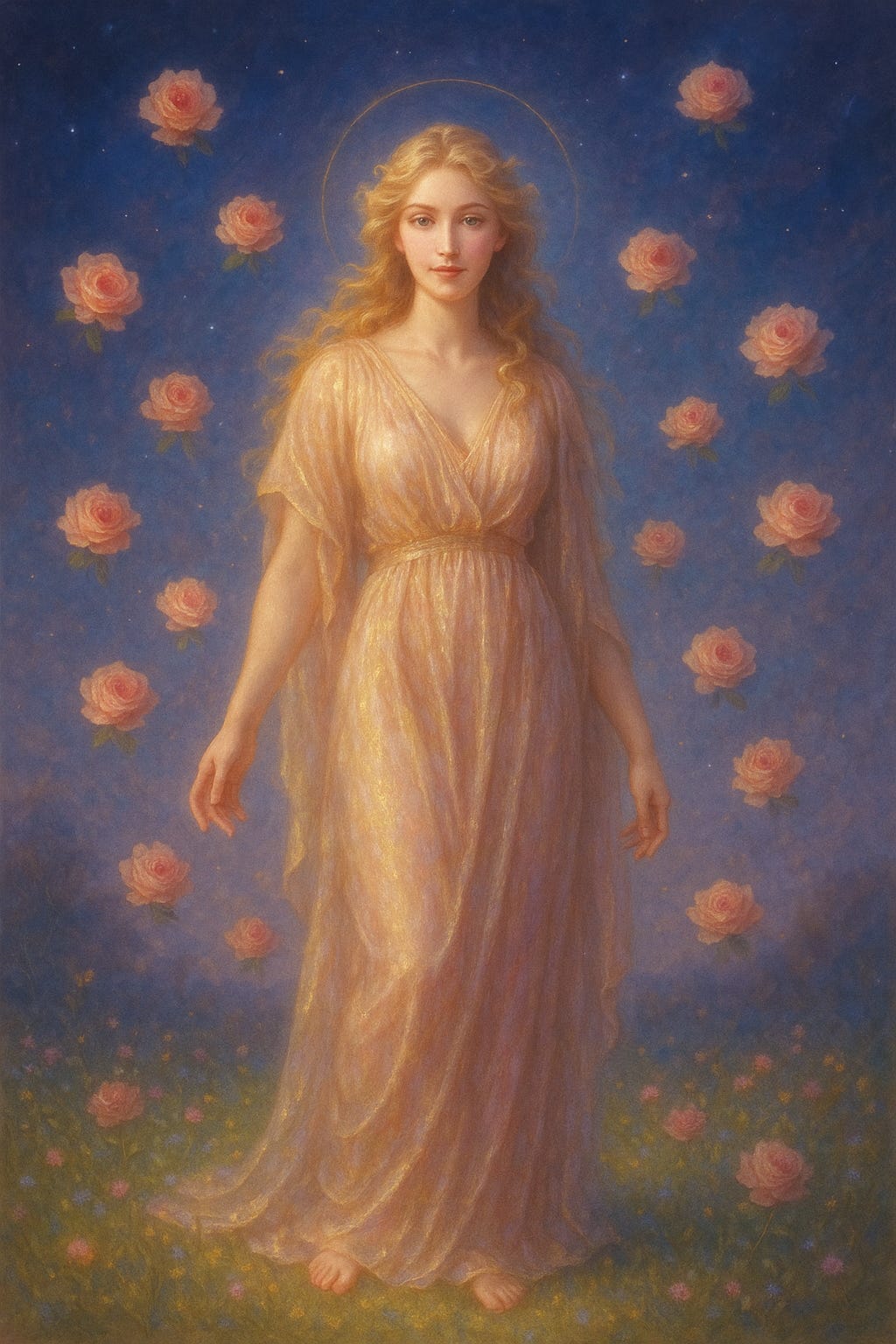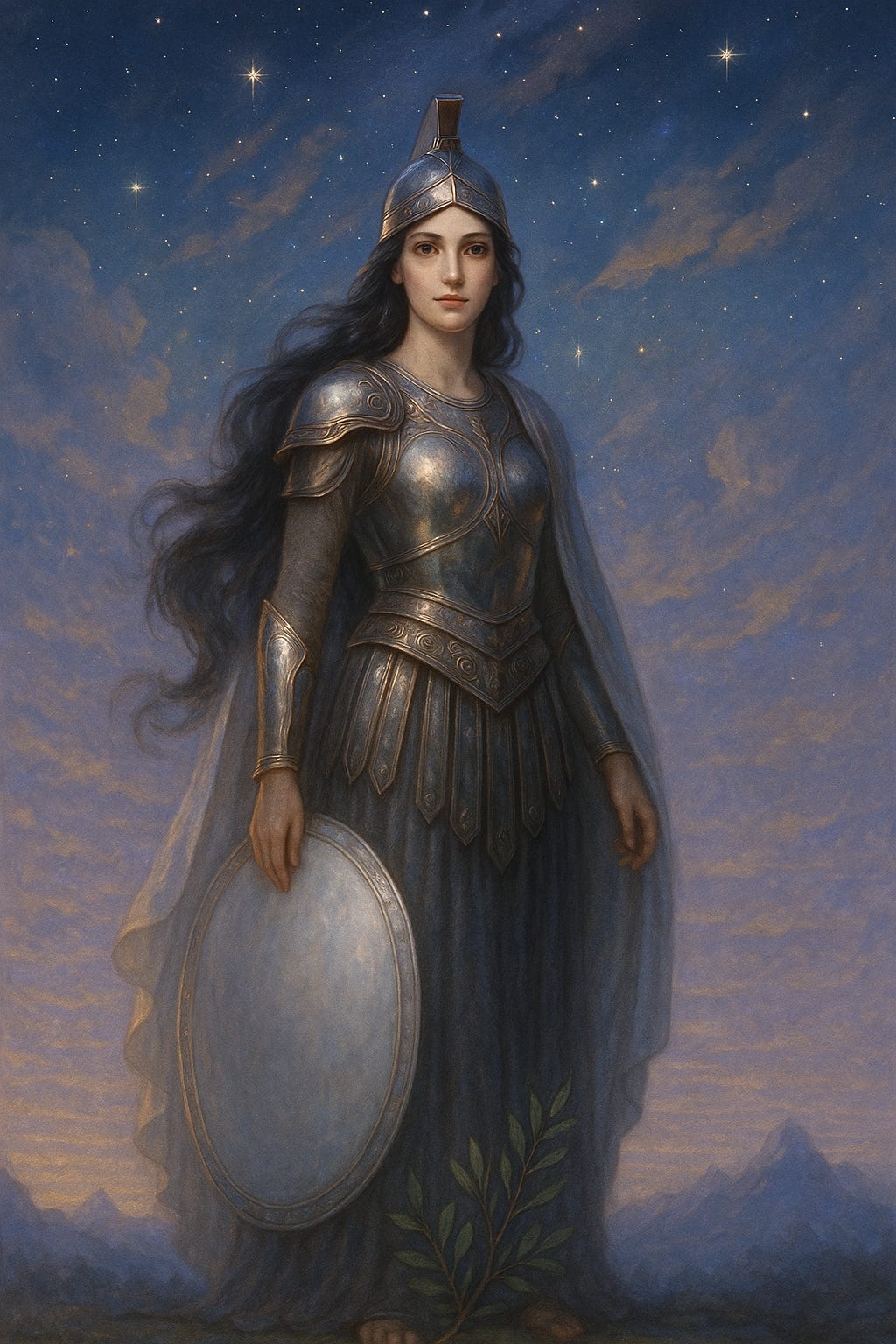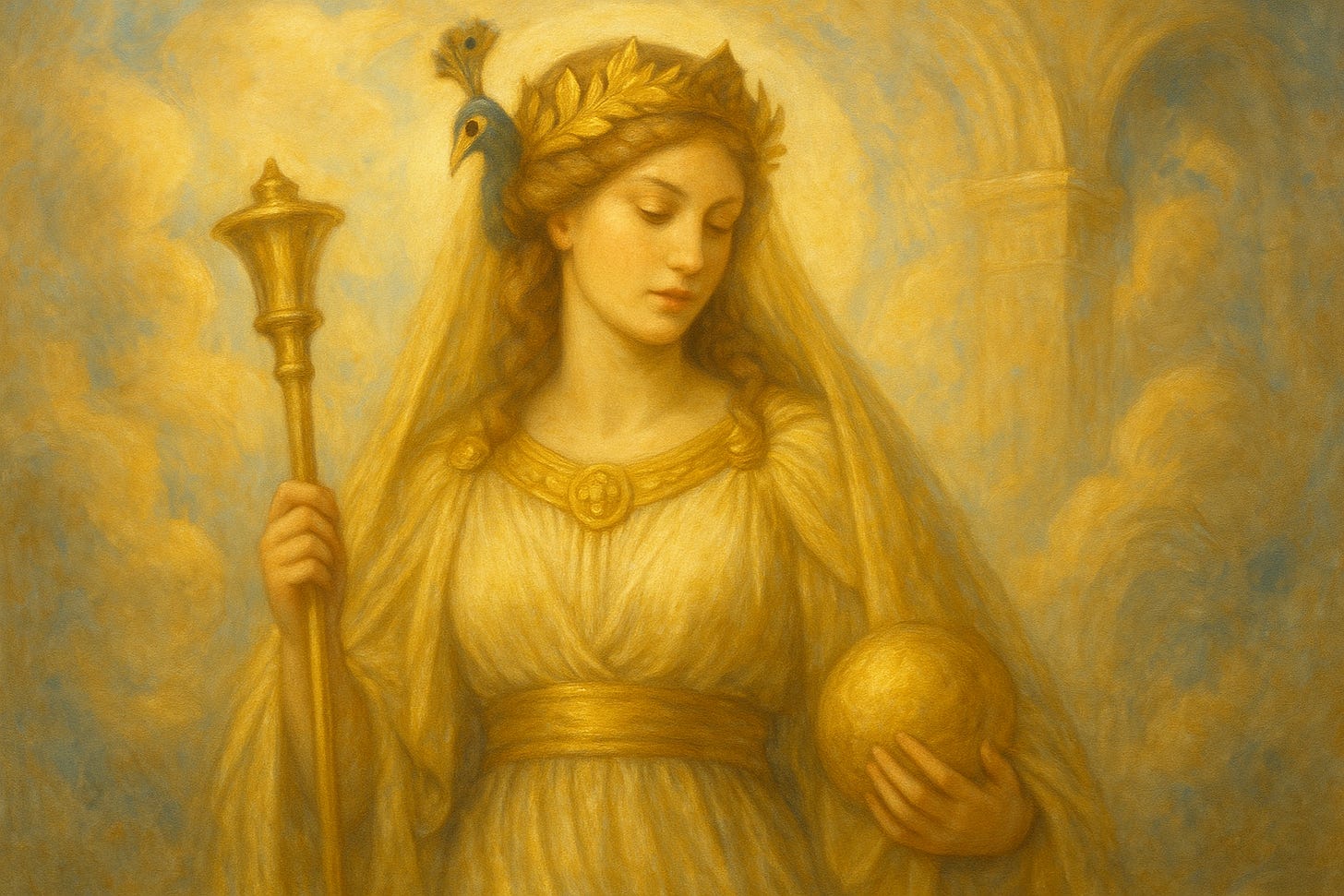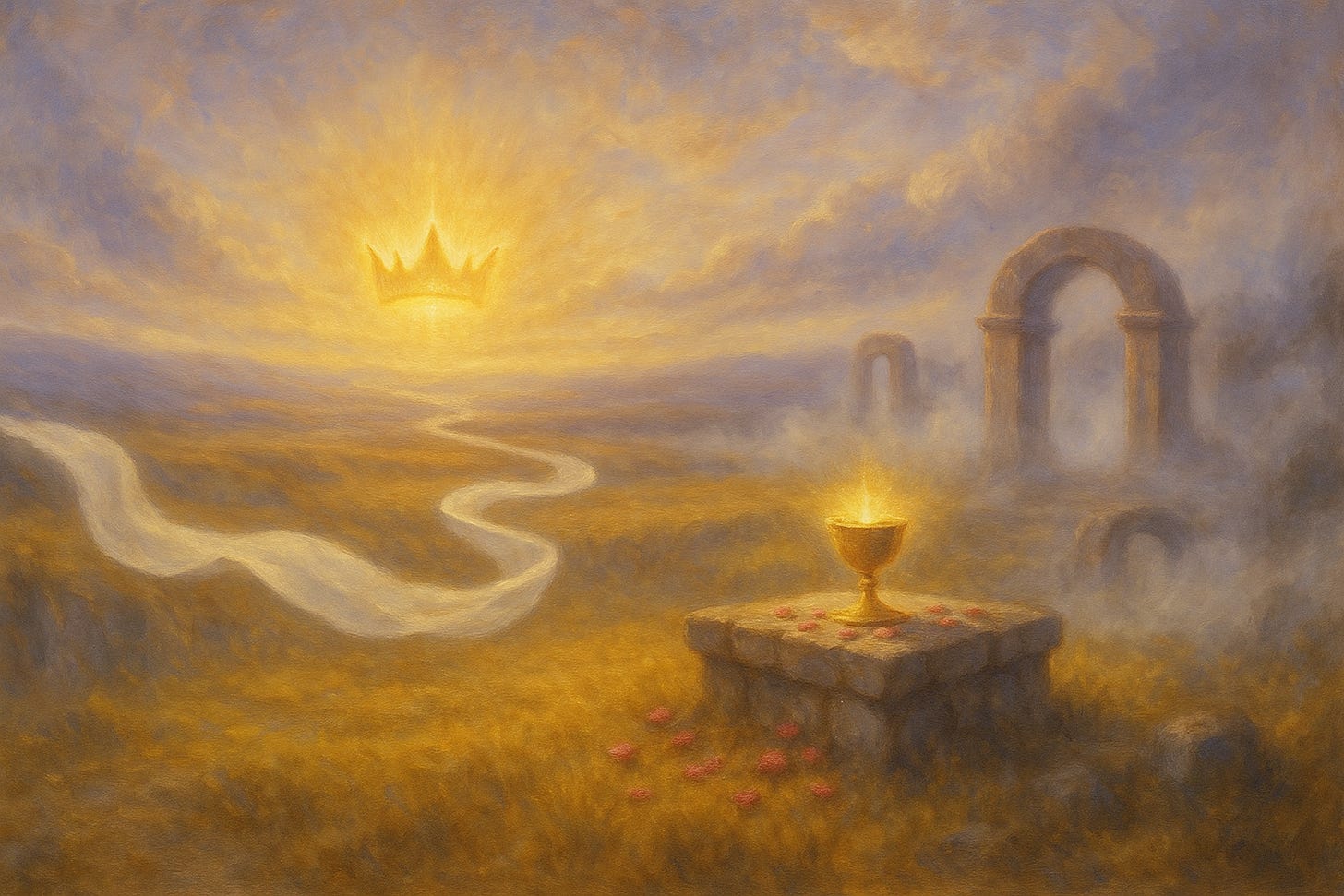The Chronicles of the Sky-Veil: Chapter IV
The Gift of Accent
The Chronicles of the Sky-Veil is a mythopoetic journey through the silence between worlds.
In The Chronicles of the Sky-Veil, the nameless man on the Journey Across the Sky-Veil writes his journal in the empty book given to him mysteriously in a satchel while sleeping. He reveals his thoughts as the Journey unfolds. In The Chronicles, the reader discovers the man’s hidden thoughts and the remembrances transforming him from a wanderer to an heir of the Majestic Highlands.
This is not sentimentality or mere imagination. It is not theology or philosophy. It is the story of the nameless man’s remembrance-in-the-world—told in myth, rooted in mystery. His is a journey from the Grey-Beneath to the Highlands of Majesty, through rose and flame, shield and crown.
From the Nameless Man’s Chronicles of the Sky-Veil1
There were paths that wound through the Sky-Veil not by way of the stars but through the subtler gravity of affection—the tender warmth of Aphrodite’s rose on the heart, as if the divine radiance favored certain routes for each soul’s ascent to the Highlands of Majesty. These were not chosen arbitrarily, but as gifts. To each wanderer, there were signs. Not all signs were apparent. Some shimmered faintly—petals on a breeze, glimpsed only when stepping back from the trail to see the garden entire.
It had once struck me as a mystery why my footsteps followed two distinct lights, seemingly too beautiful for me. I had wandered far and low. Yet, it was the heraldry of Aphrodite that first drew me out—not through command but through beauty. The Rose-Bearer did not unveil the whole landscape, but she placed into my hand a petal. That petal was a promise: that beyond this veil, a harmony yet unseen would await. And though the petal was small, it bore the fragrance of something whole.
I began to see then: this path was not random. It was shaped by desire—not the fleeting desire that flickers and fades, but the divine yearning that calls the intellect toward wisdom and the will toward love. Athena was near. I sensed her as a hypostatic emergence2 with the weight of Being that awakens. She stirred the fire of insight, revealing the need for accord between yearning and understanding. It was not enough to long; one must know why one longs. Not with certainty, but with clarity of direction. A glimpse of the end. The taste of a future spring.
For this reason, the journey along the golden thread3 did not consist only of movement but of alignment with Hera’s order across the Sky-Veil. To walk was to yearn toward the Grove Beyond,4 and to know that such yearning had been placed in me from the beginning.
The Saints of the Far Side—those who had crossed the Sky-Veil—were not lost to me. They shimmered in my memory as if they were part of the very trail beneath my feet. Yet none so brightly, none so continuously, as the two whose fragrance mingled in the valley wind: the Warrior for whom Athena heralded and the Flower borne by Aphrodite. I knew the saints not in life but in the nearness of divine love. They were not abstractions but beautiful colors to my soul’s vision—colors that had drawn me through the Veil, set beneath the heralding eye of Hera, Queen of the Highlands, who oversaw the design in the liminal landscape of the Sky-Veil.
The saints did not exude their sanctity in isolation. For no bloom stands fully without the surrounding meadows, hills, and hues that bring it into brilliance. How did I fit in? What was I? A whisper, a shadow? A scattered note beneath their hymn?
No. I was an accent.
And in the Sky-Veil, that word held weight.
Accents were not decorative. They were directional. They curved the light just so, causing the whole to unfold. The accent did not name itself. It only had meaning by proximity to something greater. Yet without it, the flower lacked its soul. The Rose-Bearer taught me this, as she placed me gently at the foot of their flower bed. The Aegis-Bearer affirmed it, as she forged me with wisdom to see that one could belong not by merit, but by love. By divine grace, I was the curvature of the light by which Aphrodite and Athena heralded their saints. I was the accent that brought it to proper perspective. The accent was the connection between the heralds of Being and their saints beyond the Veil.
I was gifted with the hypostatic emergences of Aphrodite and Athena to curve their light, complete their landscape, and reveal the glorious hues of our saints on the far side. As the accent, I was the link transfiguring Aphrodite and Athena from distorted shadows of God to redeemed heralds of the divine hues and tones beyond the Veil.5 In this mode of Being’s revelation, the heralds, Aphrodite and Athena, needed me as much as I relied on them for my journey to the saints who called.
In the days of silence, I used to question how I—a scoundrel, a fugitive from the Dark Forest6 in the Valley of Forgetfulness—could be permitted to gaze upon such wonder. And I remembered the tales: the thief who turned his face toward paradise; the soldier who blasphemed and yet fought beside a saint; the captain who cursed until a maiden with a banner demanded he kneel. These were not fables. They were foreshadowing.
In the pattern of divine desire, even a fool may become a flower in the meadow—if only he be nurtured.
And so I learned. The flower bed must have its setting. It must have the soil, the stone, the light. And it was Queen Hera, majestic in her vision, who placed each in its order in the liminal garden. The Kingdom was not chaos. It was divine order. And my being—what once had been a wandering contradiction—was now made whole not by becoming a hero, but by accepting my place as accent to the holy colors on the far side of the Veil.
Together, Aphrodite and Athena prefigured the most beautiful colors in the heavens. I was nothing but an accent. But then, the accent was no longer foolishness. It was peaceful. For it was placed rightly. The Kingdom shone not merely in the light of strength or sanctity, but with the delicate interweaving of every tone.
So, when I spoke of the Warrior and the Flower on the far side, it was not from vanity or even from admiration alone. It was obedience. It was the proper place of the accent to lift the eye toward the light. The Sky-Veil was not a place for self-declaration. It was a place for belonging. I was an accent.
And I, once foolish and lost, then foolish in divine love, whispered the names of the saints through the nearness of Aphrodite and Athena’s heraldry—because to do so was to bring delight to the One Who made the garden.
Enjoy “Queen Hera (Thrones in the Mis)” from my album The Sky-Veil, available on my music site.
Lyrics ©Walter Emerson Adams. Music and vocals by Suno ©Walter Emerson Adams.
Into the Lands Between The Sky-Veil’s air thinned down Its paths rose up unseen She of the Ox-Eyes and Crown “Your longing is not lost” Queen Hera, royal told Around her hills embossed Her throne in mists of gold Beyond her, sunlit pools A seat of might, cloud-bound In majesty, she rules She of the Ox-Eyes and Crown “It waits to be recalled” Queen Hera, august voiced The name and hope that’s trawled Ascending, heights rejoiced
✦ Sky-Veil - The threshold of Being in this mythopoetic cosmology, representing the veil between the mundane, flat world of day-to-day existence and the enchanting retrieval of Being—between symbol and meaning, longing and fulfillment. The Sky-Veil refers to this as moving from “forgetfulness” (flat world) to “remembrance” (enchantment gleaming around the divine we have always known but forgotten). It is across the Sky-Veil that hypostatic heralds of Being—embodied symbolically by the goddesses—shimmer, and through which the soul journeys in mythic wonder toward divine encounter. Saints dwell beyond the veil in the Highlands of Majesty and the contemplative Grove Beyond; the goddesses, as “hypostatic emergences” foreshadowing divine virtues, herald through the liminal “space” in the world we encounter.
✦ Hypostatic Emergence - The act or event by which a hypostatic form enters the world of experience and remembrance. A hypostatic emergence is not invented by the human mind but arises in the world as a resonant unveiling of Being. It is how mythic figures like Aphrodite, Athena, and Hera come to herald presence—not as beings, but as heralds of hypostatic meanings—Beauty, Wisdom, and Majesty.
✦ Golden Thread - A hidden tether of grace that binds the exiled soul to its divine origin, even across the abyss of forgetfulness—the flat domain of mundaneness. Though unseen, it is never severed. It glimmers beneath the surface of remembrance and longing, weaving through time like a whisper of the eternal in the fabric of the finite.
To follow the Golden Thread is to walk the path of return—drawn not by force, but by the ache of beauty, the stirrings of love, the wonder of wisdom, and the recollection of majesty once known. It is spun from Aphrodite’s first glance, carried through Athena’s flame of wisdom, and knotted at last in the crowning place of Hera’s Highlands. Each herald, each sign, each step in the Sky-Veil is bound together by its light.
✦ Grove Beyond the Veil - A sacred threshold within the cosmology of the Sky-Veil, The Grove Beyond the Veil is the quiet resting place in the nearness of the saints. It is not a destination defined by space and time one attains through intellectual effort or the scaffolding of concepts, but a sanctuary into which the soul is received through the journey across the Sky-Veil with the three heralds. It exists beyond striving, beyond explanation—a hidden region of stillness, grace, and contemplative presence.
St. John Henry Newman, in Essay on the Development of Christian Doctrine, Chapter 2, Section 1
“The religion of Christ is the fulfillment of the promises of the old Law; it is also the completion of the revelations of nature and of the aspirations of the human heart. The gods of the heathen are not nothing; they are shadows of God. For they are not creations of mere fancy, but perversions and distortions of the truth.”
“They are the witnesses of man's need and of God's providence: they are not the truth, but the expression of it when there was nothing more than expression. They are not divine, but they are the ghosts of divinity.”
✦ Dark Forest - A shadowed place from which the journey begins—the realm of exile, estrangement, and the illusion of self-sovereignty. It is where the soul wanders beneath the weight of its own definitions, having crowned the self as first philosophy. Cloaked in arguments, speculation, and the fear of mortality, the Dark Forest is a distortion of vision—a place where Being is forgotten and beauty is dismembered.
In the Dark Forest, Reason is idolized and disfigured, cut off from Love and Majesty. The Golden Thread binding the soul to the divine is unseen here, not absent but hidden. The soul must awaken, often through longing, suffering, and, finally, a radiant encounter, to see the first glimmer of the path that leads across the Bridge of Reason, through the Valley of Tears, and toward the Highlands of Majesty.
It is from the Dark Forest that the wanderer is called—and it is by grace, not intellect alone, that the path beyond it is revealed.


